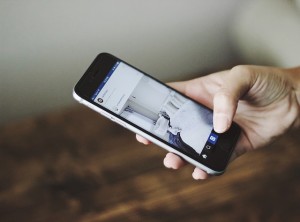- Calls to this hotline are currently being directed to Within Health, Fay or Eating Disorder Solutions
- Representatives are standing by 24/7 to help answer your questions
- All calls are confidential and HIPAA compliant
- There is no obligation or cost to call
- Eating Disorder Hope does not receive any commissions or fees dependent upon which provider you select
- Additional treatment providers are located on our directory or samhsa.gov
Balancing Social Media Use in Your Family and in Eating Disorder Recovery

Contributor: Crystal Karges, MS, RDN, IBCLC, Special Projects Coordinator at Eating Disorder Hope/Addiction Hope
Social media has enabled us to establish connections with people on a global basis, yet at the same time, we have become more isolated as a culture. We are accustomed to scrolling through social media on our phones, tablets, and other electronic devices, often surveying the lives of others from a distant.
In the world of social media, we have the opportunity to curate images to be exactly what we want others to observe, whether filtered or snapshots of the better parts of our lives. This creates a façade that often masks reality.
Finding Balance
When it comes to eating disorder recovery, social media can be especially difficult to approach and balance. There are an abundance of websites, communities, groups, forums, etc. that can be triggering to an individual who is in recovery from an eating disorder. This can be difficult to navigate through when in recovery; though learning to establish a balance with social media is essential. Individuals who may be susceptible to developing an eating disorder or who may be in recovery may find that social media either hinders or helps their journey.
As a family with a loved one in recovery, it may feel uncertain how to approach social media, particularly in a way that is balanced. If you have a loved one in recovery, encourage open communication about things that may be explored via social media.
You may ask your family member about the social media platforms they are using or the types of communities they might be engaging with. Encourage boundaries with family members when it comes to social media to help support relationship building. For example, it may be a family rule that phones or electronic devices are not used at meal times or after a certain time in the day.
Finding the Positive
 Social media platforms can be a positive aspect of recovery when used appropriately. Engaging with individuals who are uplifting and encouraging, who frequently post positive materials, and support the recovery journey can be a beneficial way to build a helpful community.
Social media platforms can be a positive aspect of recovery when used appropriately. Engaging with individuals who are uplifting and encouraging, who frequently post positive materials, and support the recovery journey can be a beneficial way to build a helpful community.
Scheduling times throughout the week in which you disengage and take a break from social media can also be important to maintain balance and recovery from an eating disorder a priority. Above all, it is important to remember that social media does not take the place of face to face time with the ones you love, and quality time is necessary for building the bonds of family.
Community Discussion – Share your thoughts here!
How does your family unplug from social media and enjoy fun family time together? What activities do you do together?
 About the Author: Crystal is a Masters-level Registered Dietitian Nutritionist (RDN) with a specialty focus in eating disorders, maternal/child health and wellness, and intuitive eating. Combining clinical experience with a love of social media and writing, Crystal serves as the Special Projects Coordinator for Eating Disorder Hope/Addiction Hope, where her passion to help others find recovery and healing is integrated into each part of her work.
About the Author: Crystal is a Masters-level Registered Dietitian Nutritionist (RDN) with a specialty focus in eating disorders, maternal/child health and wellness, and intuitive eating. Combining clinical experience with a love of social media and writing, Crystal serves as the Special Projects Coordinator for Eating Disorder Hope/Addiction Hope, where her passion to help others find recovery and healing is integrated into each part of her work.
As a Certified Intuitive Eating Counselor, Crystal has dedicated her career to helping others establish a healthy relationship with food and body through her work with EDH/AH and nutrition private practice.
The opinions and views of our guest contributors are shared to provide a broad perspective of eating disorders. These are not necessarily the views of Eating Disorder Hope, but an effort to offer discussion of various issues by different concerned individuals.
We at Eating Disorder Hope understand that eating disorders result from a combination of environmental and genetic factors. If you or a loved one are suffering from an eating disorder, please know that there is hope for you, and seek immediate professional help.
Last Updated & Reviewed By: Jacquelyn Ekern, MS, LPC on June 8, 2016
Published on EatingDisorderHope.com

The EatingDisorderHope.com editorial team comprises experienced writers, editors, and medical reviewers specializing in eating disorders, treatment, and mental and behavioral health.

